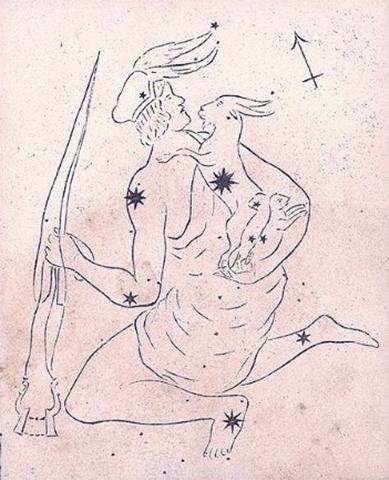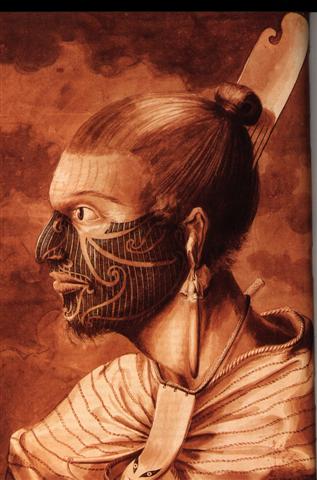Presumably side b on the C tablet was intended to present the Pleiades year in contrast to the Rigel year documented on side a: ... In view of the almost universal prevalence of the Pleiades year throughout the Polynesian area it is surprising to find that in the South Island and certain parts of the North Island of New Zealand and in the neighboring Chatham Islands, the year began with the new Moon after the yearly morning rising, not of the Pleiades, but of the star Rigel in Orion ...
... The mythic landscape was an 'implex', by which term is meant a world of implications. ... Fanciful, assuredly, but neither the Milky Way nor the terrestrial Ganges offered any basis for the imagery of a river flowing to the four quarters of the earth 'for the purification of the three worlds'. One cannot get away from the 'implex' and it is now necessary to consider the tale of a new skeleton map, alias skambha: the equinoctial colure had shifted to a position where it ran through stars of Auriga and through Rigel. Skambha, as we have said, was the World Tree consisting mostly of celestial coordinates, a kind of wildly imaginative armillary sphere. It all had to shift when one coordinate shifted ... Because on side a we can find a connection with Capella (*78.4) and Rigel.
The black-marked 'nut' at bottom in Ca4-1 could represent the dark face of the new moon as well as Elnath. At the top we can identify the Mother Goat (Capella, α Aurigae), and at left we can see Menkalinan (β) with Mahashim (θ) below.
Here Metoro seems to have perceived the onset of nighttime, because ashes should mark where the great fire in the sky had left:
... His temple-palace was composed of four radiant apartments: one toward the east, yellow with gold; one towards the west, blue with turquoise and jade; one toward the south, white with pearls and shells; one towards the north, red with bloodstones - symbolizing the cardinal quarters of the world over which the light of the sun holds sway. And it was set wonderfully above a mighty river that passed through the midst of the city of Tula; so that every night, precisely at midnight, the king descended into the river to bathe; and the place of his bath was called 'In the Painted Vase', or 'In the Precious Waters' ... Kau (Tau) is a word which covers much ground: Tau. Year (ta'u), he-hoa ite ta'u, to confess to a crime committed long ago, by publishing it in the form of a kohau motu mo rogorogo (rongorongo tablet). Vanaga. 1.To hang (tau), to perch (said of chickens on tree branches at night); rock on the coast, taller than others so that something can be deposited on it without fear of seeing it washed away by the waves; hakarere i ruga i te tau, to place something on such a rock; tau kupega, rope from which is hung the oval net used in ature fishing. 2. Pretty, lovely; ka-tau! how pretty! Vanaga. 1. Year, season, epoch, age. P Pau.: tau, a season, period. Mgv.: tau, a year, the season of breadfruit. Mq.: tau, year. Ta.: tau, season, time. 2. Fit, worthy, deserving, opportune; tae tau, impolite, ill-bred, unseemly; pei ra tau, system. PS Mgv.: tau, fit, suitable, proper. Sa.: tau, right, proper. To.: tau, becoming, fit, proper, agreeable. Fu.: tau, fit, proper. 3. To perch. P Pau.: tau, a perch for a bird. Mgv.: tau, to mount on a person's back. Mq.: tau, to perch, to rest on. Ta.: tau, to perch, to alight on. 4. To hang; hakatau, necklace; hakatautau, to append. P Pau.: fakatautau, to hang up. Mq.: tautau, id. Ta.: faatautau, id. 5. Anchor; kona tau, anchorage, port. P Mq.: katau, anchor. Ta.: tau, id. 6. To fight; hakatau, challenge, to defy, to incite; hakatautau, to rival. P Ma.: whakatatau, to quarrel. Churchill. Pau.: fakatau, indolent. Ta.: faatau, id. Fakatautau, to delay, to defer. Ta.: haatautau, id. Churchill. The Malay word for 'year' is taun or tahun. In all Polynesian dialects the primary sense is 'a season', 'a period of time'. In the Samoan group tau or tausanga, besides the primary sense of season, has the definite meaning of 'a period of six months', and conventionally that of 'a year', as on the island of Tonga. Here the word has the further sense of 'the produce of the year', and derivatively 'a year'. In the Society group it simply means 'season'. In the Hawaiian group, when not applied to the summer season, the word keeps its original sense of 'an indefinite period of time', 'a life-time, an age', and is never applied to the year: its duration may be more or less than a year, according to circumstances. So far our authority (Fornander, I, 124; cp. 119). It seems however to be questionable whether the original sense is not the concrete 'produce of the seasons', rather than the abstract 'period of time'. It is significant that on the Society Islands the bread-fruit season is called te tau, and the names of the other two seasons, te tau miti rahi and te tau poai, are formed by adding to this name. Nilsson.
As to Pili (Piri) it suggests the idea of 'close embrace': ... They were Ranginui, the Sky Father, and Papatuanuku, the Earth Mother, both sealed together in a close embrace. Crushed between the weight of their bodies were their many children, whose oppression deepened. They yearned to be free; they fought their parents and each other to break loose. Tuumatauenga, virile god of war, thrust and shouted; Tangaroa of the oceans whirled and surged; Tawhirirangimaatea, Haumiatiketike and Rongomatane, of wild foods and cultivated crops, tried their best but were not successful; and Ruamoko, god of earthquakes, yet to be born, struggled in the confinement of his mother's womb ... Of them all, Taane Mahuta, the god of the forests, was the most determined; he set his sturdy feet upon his father's chest, and braced his upper back and shoulders against the bosom of his mother. He pushed; and they parted. So the world, as the Maori understand it, came into being ... Piri. 1. To join (vi, vt); to meet someone on the road; piriga, meeting, gathering. 2. To choke: he-piri te gao. 3. Ka-piri, ka piri, exclamation: 'So many!' Ka-piri, kapiri te pipi, so many shellfish! Also used to welcome visitors: ka-piri, ka-piri! 4. Ai-ka-piri ta'a me'e ma'a, expression used to someone from whom one hopes to receive some news, like saying 'let's hear what news you bring'. 5. Kai piri, kai piri, exclamation expressing: 'such a thing had never happened to me before'. Kai piri, kai piri, ia anirá i-piri-mai-ai te me'e rakerake, such a bad thing had never happened to me before! Piripiri, a slug found on the coast, blackish, which secretes a sticky liquid. Piriu, a tattoo made on the back of the hand. Vanaga. 1. With, and. 2. A shock, blow. 3. To stick close to, to apply oneself, starch; pipiri, to stick, glue, gum; hakapiri, plaster, to solder; hakapipiri, to glue, to gum, to coat, to fasten with a seal; hakapipirihaga, glue. 4. To frequent, to join, to meet, to interview, to contribute, to unite, to be associated, neighboring; piri mai, to come, to assemble, a company, in a body, two together, in mass, indistinctly; piri ohorua, a couple; piri putuputu, to frequent; piri mai piri atu, sodomy; piri iho, to be addicted to; pipiri, to catch; hakapiri, to join together, aggregate, adjust, apply, associate, equalize, graft, vise, join, league, patch, unite. Piria; tagata piria, traitor. Piriaro (piri 3 - aro), singlet, undershirt. Pirihaga, to ally, affinity, league. Piripou (piri 3 - pou), trousers. Piriukona, tattooing on the hands. Churchill. On the other side of midnight was Pilipuka (Piriputa). Tiputa. Pau.: To bore, to perforate. Ta.: tiputa, to pierce. Mq.: tiputa, id. Ha.: kipuka, an opening. Churchill. The rei puta was a whale bone 'saviour of life': Rei. 1. To tread, to trample on: rei kiraro ki te va'e. 2. (Used figuratively) away with you! ka-rei kiraro koe, e mageo ê, go away, you disgusting man. 3. To shed tears: he rei i te mata vai. 4. Crescent-shaped breast ornament, necklace; reimiro, wooden, crescent-shaped breast ornament; rei matapuku, necklace made of coral or of mother-of-pearl; rei pipipipi, necklace made of shells; rei pureva, necklace made of stones. 5. Clavicle. Îka reirei, vanquished enemy, who is kicked (rei). Vanaga. T. 1. Neck. 2. Figure-head. Rei mua = Figure-head in the bow. Rei muri = Figure-head in the stern. Henry. Mother of pearl; rei kauaha, fin. Mgv.: rei, whale's tooth. Mq.: éi, id. This is probably associable with the general Polynesian rei, which means the tooth of the cachalot, an object held in such esteem that in Viti one tooth (tambua) was the ransom of a man's life, the ransom of a soul on the spirit path that led through the perils of Na Kauvandra to the last abode in Mbulotu. The word is undoubtedly descriptive, generic as to some character which Polynesian perception sees shared by whale ivory and nacre. Rei kauaha is not this rei; in the Maori whakarei designates the carved work at bow and stern of the canoe and Tahiti has the same use but without particularizing the carving: assuming a sense descriptive of something which projects in a relatively thin and flat form from the main body, and this describes these canoe ornaments, it will be seen that it might be applied to the fins of fishes, which in these waters are frequently ornamental in hue and shape. The latter sense is confined to the Tongafiti migration. Reirei, to trample down, to knead, to pound. Pau.: Rei-hopehopega, nape. Churchill.
|
|||||||||||||||||||||||||||||||||||||||||||||||||||||





